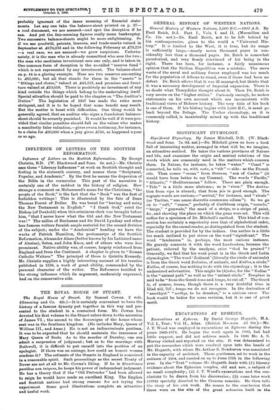SIGNIFICANT ETYMOLOGY.
Significant Etymology. By James Mitchell, D.D. (W. Black- wood and Sons. 7s. Cid. net.)—Dr. Mitchell gives us here a book full of interesting matter, arranged in what will be, we imagine, an attractive method. He takes the various provinces of Nature and life, and examines the origin and mutual relations of the words which are commonly used in the matters which concern them. In Nature, for instance, he takes "water." "Coast" is connected, he tells us, with costa, a "rib" = side : so the French cote. Then comes " ocean" from Oceanus, " son of Caelus" (it would have been better to say Uranus). The words "Pacific," "Atlantic," " Mediterranean" follow. These are plain enough. " Tide " is a little more abstruse ; so is "river." The deriva- tion from rips is absurd; that from Aar is good enough. The cognate words are curious,—" arrival," for instance, and "rivals" (so Tacitus, " uno amne discretis connexum odium"). So we go on to " raft," "canoe," probably of Caribbean origin, " coracle," " barge," " gunwale," the mark of a stripe, so a stripe of paint, &c., and showing the place on which the guns were set. This will suffice for a specimen of Dr. Mitchell's method. This kind of con- nexion has certainly a superiority over that of alphabetical order, especially for the casual reader, as distinguished from the student. The student is provided for by the indices. Our author is a. little too much inclined to put stress on the word "significant." The word "laudanum" is, perhaps, the most curious instance. He gravely connects it with tho word Laudantlum, because the patient, relieved by the anodyne, cries " God be praised" ! Generally, we find that his weak point is in the Greek and Latin etymologies. "The word Zodiacal' (literally the circle of animals) is from the Greek word Zodiakos, of animals, and Kukios, a circle." Kuklos, of course, has nothing to do with the etymology ; it is the understood substantive. This might be (h)odos, for the " Zodiac" is the " animal path" as well as the " animal circle." Templum is said to be " from the Greek temo and tempo, to cut off." The Greek is, of course, temno, though there is a very doubtful amo in Iliad xiii. 707 ; tempo we do not recognise. In the derivation of "amethyst" "methys, to be drunken," is a curious error. Tho book would be better for some revision, but it is one of great merit.
























































 Previous page
Previous page